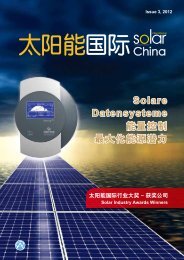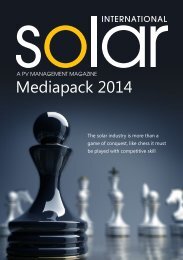A clearer road ahead
A clearer road ahead - Solar International Magazine
A clearer road ahead - Solar International Magazine
- No tags were found...
You also want an ePaper? Increase the reach of your titles
YUMPU automatically turns print PDFs into web optimized ePapers that Google loves.
INDUSTRY I OPINION<br />
Counting the costs<br />
EU ProSun has identified many forms of significant<br />
government subsidies to Chinese solar<br />
manufacturers. For instance, Chinese banks<br />
implement government policy by giving<br />
preferential terms to solar manufacturers, and, if a<br />
borrower cannot pay back its loans, they may be<br />
written-off, extended indefinitely or paid off by<br />
other government-controlled entities. This makes it<br />
easier, cheaper, and a lot less risky for Chinese<br />
solar companies to obtain financing.<br />
decrease if anti-dumping measures are imposed<br />
on unfairly traded imports from China. Trade<br />
measures would only restore fair competition with<br />
China, and prevent a monopoly over solar<br />
manufacturing that would be destructive for<br />
European consumers, jobs, installers and industry.<br />
Illegal Subsidies<br />
China declared photovoltaics as a key industry<br />
and emerging market and dedicated this hightechnology<br />
a separate chapter in the 12th Five<br />
Year Plan of the People’s Republic of China,<br />
mandating banks, local governments and other<br />
financing sources to heavily subsidise the solar<br />
industry. Whereas European support schemes<br />
such as FITs are available to everybody, Chinese<br />
government subsidies are only available to<br />
Chinese companies.<br />
Massive subsidies and state intervention have<br />
stimulated overcapacity more than 20 times total<br />
Chinese consumption and close to double total<br />
global demand. Hence, more than 90% of Chinese<br />
production has had to be exported. Irrational<br />
overproduction on this scale cannot generate<br />
profits.<br />
Chinese producers are highly indebted; and make<br />
significant losses, but are still ramping up<br />
production. Many of the biggest Chinese<br />
companies are insolvent according to Western<br />
standards, however subsidies save them from<br />
bankruptcy. State-owned Chinese banks continue<br />
lending money to unprofitable companies in order<br />
to support the PV industry at any cost. European<br />
companies do not benefit from this kind of<br />
support, therefore are driven out of the market one<br />
by one due to Chinese dumped prices.<br />
In accordance with China’s Five Year Plan until<br />
2015, credit lines have been granted by the state<br />
banks at very favourable lending conditions and<br />
subsidised at all levels of government. One bank<br />
alone - China Development Bank Corp. - has<br />
extended € 33 billion in credit lines to 12 Chinese<br />
solar companies since 2010, according to<br />
Bloomberg. Additional regional and local subsidies<br />
have been granted, such as the repayment of<br />
interest, electricity costs, and transaction costs for<br />
land, as well as credit guarantees. State-owned<br />
banks provide additional credit facilities for the<br />
purpose of increasing sales in Europe. For<br />
example, JinkoSolar reported this week that it<br />
signed a US$ 1 billion strategic cooperation<br />
agreement between its Swiss subsidiary and the<br />
China Development Bank to “expand the<br />
Company’s presence overseas”. The existence of<br />
massive Chinese subsidies was also recently<br />
confirmed in a similar investigation into PV cells by<br />
the US government.<br />
In the last 5 years, around 300,000 jobs were<br />
created in the renewable energy sector, many<br />
more will be created in the future – most of them in<br />
the photovoltaic sector. Unless the EU takes urgent<br />
action, many jobs will be at risk, as there will no<br />
longer be any manufacturing or R&D solar jobs left<br />
in Europe, in the face of such aggression from<br />
China.<br />
EU ProSun, the Sustainable Solar Energy Initiative<br />
for Europe, represents the majority of solar<br />
manufacturing in Europe. In reply to the unfair<br />
Chinese market practices EU ProSun supporters<br />
filed an anti-dumping and anti-subsidy complaint<br />
with the European Commission with a request to<br />
reestablish a level playing field in the sector and<br />
come back to international fair free trade.<br />
© 2012 Angel Business Communications.<br />
Permission required.<br />
Massive subsidies and state intervention have stimulated<br />
overcapacity more than 20 times total Chinese consumption<br />
and close to double total global demand. Hence, more<br />
than 90% of Chinese production has had to be exported<br />
30 www.solar-international.net I Issue IX 2012








